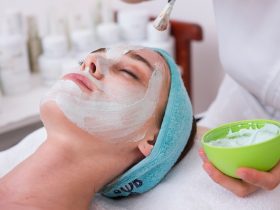Identify Your Skin Type
The first step in finding the right skincare routine is to identify your skin type. Sensitive skin can be tricky to diagnose since it can be prone to redness, flaking, and breakouts, similar to acne prone skin. Your dermatologist can help you determine your skin type and recommend the best products for you. If you don’t have access to a dermatologist, try to identify your skin type by looking for signs of sensitivity. If your skin feels tight, itchy, or irritated after using a product, it’s likely that it’s too harsh for your skin.
Cleansing
It’s important to use a gentle cleanser that won’t strip your skin of its natural oils. Look for cleansers that are labeled “for sensitive skin” and avoid those that contain harsh additives such as sulfates, parabens, alcohol, and fragrances. You should also avoid cleansers that contain exfoliating beads, which can be too abrasive for sensitive skin. Instead, opt for a mild, non-foaming cleanser that won’t leave your skin feeling dry or tight. If you have acne prone skin, you may want to use an acne-fighting cleanser that contains salicylic acid or benzoyl peroxide.
Moisturizing
It’s important to keep your skin moisturized, especially if you have sensitive acne prone skin. Look for a moisturizer that is lightweight and non-comedogenic, which means it won’t clog your pores. Avoid moisturizers that contain fragrances, dyes, and other harsh ingredients, which can irritate your skin. You may want to try a moisturizer that contains ceramides, which help to repair the skin’s barrier and protect it from environmental stressors. If you have oily skin, opt for a light, oil-free moisturizer.
Protect From the Sun
It’s important to protect your skin from the sun’s harmful UV rays, even if you have sensitive acne prone skin. Use a broad-spectrum sunscreen with an SPF of at least 30 that is labeled “for sensitive skin.” Avoid sunscreen that contains fragrances, parabens, and other harsh chemicals, which can irritate your skin. Look for a sunscreen that is lightweight and non-greasy, so it won’t clog your pores.
Treatments and Products
If you’re dealing with acne, there are a few treatments and products that can help. Look for products that contain salicylic acid or benzoyl peroxide, which can help to reduce inflammation and clear up breakouts. If your acne is severe, you may need to use a prescription medication such as tretinoin or an antibiotic. It’s also important to use a spot treatment to target individual breakouts. Avoid products that contain alcohol, which can dry out your skin and make it more prone to breakouts. You may also want to try a skin-calming serum or gel that contains anti-inflammatory ingredients such as chamomile or aloe vera.
Home Remedies
There are also a few home remedies that can help soothe and calm your skin. One of the most popular is honey, which has natural anti-inflammatory and antibacterial properties. You can create a simple face mask by mixing one teaspoon of honey with one teaspoon of warm water. Apply the mixture to your face and leave it on for 15 minutes before rinsing it off. You may also want to try a yogurt mask, which can help to reduce inflammation and redness. Mix one tablespoon of plain yogurt with one teaspoon of honey and apply it to your face. Leave the mask on for 15 minutes before rinsing it off.
Gentle Exfoliation
Gentle exfoliation can help to remove dead skin cells, which can clog your pores and lead to breakouts. However, it’s important to be gentle when exfoliating sensitive skin. Avoid physical exfoliants such as scrubs, which can be too abrasive. Instead, opt for a chemical exfoliant such as an alpha hydroxy acid or beta hydroxy acid. These acids help to loosen the bonds between dead skin cells, making it easier to remove them without irritating your skin.
Try Natural Ingredients
There are also a few natural ingredients that can help to soothe and calm your skin. One of the most popular is aloe vera, which is a natural anti-inflammatory. Look for products that contain aloe vera, such as serums, gels, and moisturizers. You can also try a honey mask, which can help to reduce redness and inflammation. You may also want to try a tea tree oil treatment, which can help to clear up breakouts.
Stress Management
Stress can have a big impact on your skin, so it’s important to find ways to manage it. Try to get plenty of rest and exercise, and find ways to reduce your stress levels. Aromatherapy, yoga, and meditation can all help to reduce stress and improve your skin. If you’re feeling overwhelmed, talk to a therapist or counselor who can help you manage your stress.
Conclusion
Sensitive acne prone skin can be tricky to manage, but there are a few tips and tricks that can help. Identify your skin type, use gentle cleansers and moisturizers, and protect your skin from the sun. Try treatments and products that contain salicylic acid or benzoyl peroxide, and look for natural ingredients such as aloe vera or honey. Don’t forget to exfoliate gently and manage your stress, which can have a big impact on your skin.
 Source: labeling123.blogspot.com
Source: labeling123.blogspot.com Source: www.pinterest.com
Source: www.pinterest.com Source: www.pinterest.com
Source: www.pinterest.com Source: www.pinterest.com
Source: www.pinterest.com Source: www.reddit.com
Source: www.reddit.com Source: www.pinterest.es
Source: www.pinterest.es Source: www.jtayandlittlea.com
Source: www.jtayandlittlea.com Source: www.pinterest.com
Source: www.pinterest.com


Leave a Reply